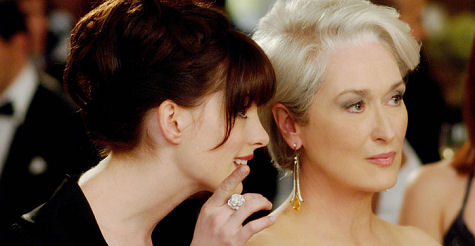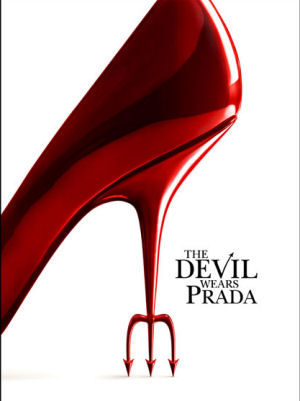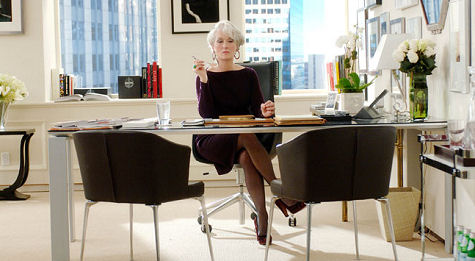Fashion Abrasion
To the already-formed consensus on The Devil Wears Prada (20th Century Fox, 6.30), I have nothing new or startling to add.
Without Meryl Streep and Stanley Tucci’s performances, this very carefully measured girl movie set in the never-jangled world of a big-time fashion magazine — a tale of a young woman getting bruised, and then wising up and finding her way through a very tough racket — would be okay but only that. But with them — because of them — it’s savory as hell at times.

Anne Hathaway, Meryl Streep in David Frankel’s The Devil Wears Prada.
I don’t like chick flicks any more than the next guy, but this is a reasonably sharp and grown-up one with an above-average, big-city IQ.
It could be a little more wicked. I don’t know the fashion industry, but I’m sure it’s a lot darker, druggier, randier and more complex than the way it’s portrayed in The Devil Wears Prada. But this is a 20th Century Fox enterprise aimed at women with certain limitations (cultural, educational), and as such is above average.
< ?php include ('/home/hollyw9/public_html/wired'); ?>
Anne Hathaway’s performance as Andy Sachs, the main protagonst, is fine…but she’s been drawn with a soft pencil and it’s easy to give up on her — the character — early on because she feels too clueless and unparticular…too vaguely motivated as to why she’s working for Streep’s Miranda Priestly, the editor of a hugely successful fashion magazine called Runway.
One particular beef: Andy, we’re told, majored in journalism and edited a school paper, and yet, we’re told, she’s never heard of Priestley or Runway when she first interviews for the job. What would your opinion be of a real-life journalism major from a big school who’s never heard of Vogue or Anna Wintour?
I have some perspective on Adrien Grenier’s performance as Nate, the cute boyfriend whose purpose is to show us how Andy is relinquishing her everyday menschiness in order to perform her job. Nate, I can tell you, was a total drag in the Prada script that I read last year — too mopey, a guilt-tripper — but Grenier has given him extra flavorings and humor and made him more intriguing.
All this is secondary, of course, to Streep and Tucci, Streep and Tucci, Streep and Tucci…

In Lauren Weisberger’s best-seller of the same, Miranda Priestly was a shrieking banshee and a fit-thrower. (She’s based, accurately or not, on Wintour.) But Streep, very wisely, has toned the character down and, to a certain extent, humanized her.
I’ve been telling friends that Streep gives a performance very much like Al Pacino’s as Michael Corleone in The Godfather, Part II . Everything she says is quiet, muted, almost whispery…but there’s always something ferocious and vaguely malignant going on beneath the surface.
Miranda’s readiness to dismiss, berate or crush her underlings with the slightest facial gesture is a hoot. No one has ever made the words “that’s all” sound so resoundingly like a smart slap across the face. Streep’s final on-screen moment — I won’t describe it except to say it’s all about thoughts she’s having as she sits in the back seat of a chauffeured car — is hilarious.
And yet you can sense Miranda’s desperation and loneliness from time to time, and almost always her apartness. She loves her job and her power and won’t suffer fools, but you wouldn’t call her “happy.” (Or maybe you would.) Either way, this is an instant Oscar-contender performance, probably in the supporting category.
I don’t know many gay guys Tucci has played over the last five years, but he knows this turf and plays it like a champ every time, even when he doesn’t have much of a role, as in Prada. He’s playing Nigel, Streep’s right-hand man who’s also a caring friend of Andy’s, and he’s exactly right in every scene.

Emily Blunt gives a feisty, brittle performance as Emily, Miranda’s top assistant who’s so concerned with inner-office status that she’s always on the brink of nervous collapse. Thing is, I didn’t much like her. Always saying something bitchy or fuming, or acting hurt or shocked, or beset by a cold with sniffles and swollen red eyes. All reaction…nothing centered.
You can certainly detect the influence of director David Frankel’s having directed several episodes of Sex and the City and Entourage.
When I first saw Prada in a suburb north of Las Vegas, I was sitting in the midst of a group of women in their 30s and 40s. When it was over I could feel their reactions. They were okay with it, but the emotional impact wasn’t much. They weren’t lifted out of their seats. I don’t know if this means anything or not.
The weakness, I know, is with Andy and not Miranda or Nigel. It’s not a fixable problem at this stage, so either you roll with it or you don’t.
